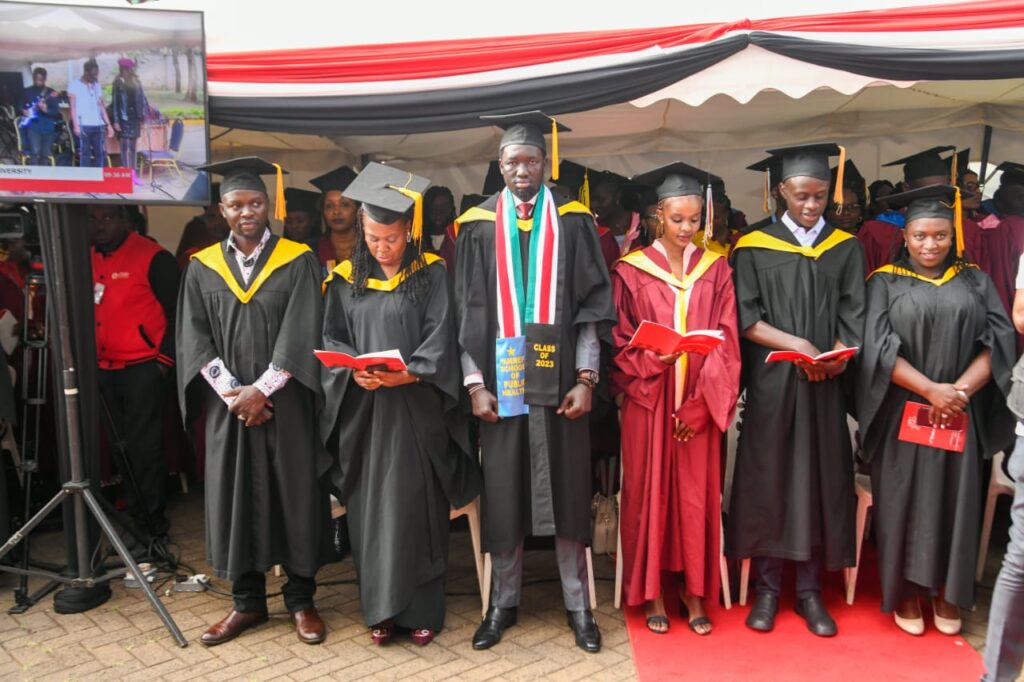Health Cabinet Secretary Susan Nakhumicha has called for higher learning institutions and research centres to reflect on the pressing Human Resources for Health (HRH) gaps faced by our nation to effectively address the pressing challenges faced by our healthcare system.
Speaking today during the 4th Amref International University Graduation, held under the theme “Revolutionizing Primary Health Care through higher education and research,” the CS noted that Kenya, like many countries, experiences a shortage of health workers, particularly in rural areas, where access to healthcare is limited.
“In 2018, there were 13.8 health workers per 10,000 people in Kenya, compared to the WHO recommendation of 44.5 health workers per 10,000 people. This scarcity hinders access to quality healthcare, perpetuating disparities and limiting the delivery of essential services,” she noted.
She further reiterated that the distribution of health workers is uneven, with a concentration in urban areas which creates an imbalance leading to a scarcity of healthcare professionals in rural regions, creating barriers to essential services and exacerbating health disparities.
She added that “It is imperative that we strive for a balanced distribution of health workers to bridge this gap and provide equal opportunities for healthcare across our nation.”
In addition to the shortage and uneven distribution, Kenya also faces a deficit of skilled health workers, including doctors, nurses, and midwives.

This shortage not only hampers timely diagnosis and treatment but also affects our ability to deliver specialized care. Addressing this deficit is crucial to enhance the quality of healthcare services and improve health outcomes for our population.
Nakhumicha added that the high turnover rates among health workers pose a significant challenge to maintaining a stable and skilled workforce with factors such as low salaries, poor working conditions, and limited career opportunities contributing to the issue.
“To build a sustainable healthcare system, we must prioritize measures that enhance job satisfaction, offer competitive compensation, and provide avenues for professional growth and development,” she averred.
Furthermore, she stated the Kenyan government is committed to tackling these HRH gaps head-on as they have already taken significant steps to address these challenges and improve the health workforce in our nation.
Firstly, the government is investing in the training and education of health workers. We have increased funding for health schools and training programs, providing more opportunities for aspiring healthcare professionals.
Additionally, the ministry has implemented scholarships and financial assistance programs to ensure that talented individuals can pursue their dreams of serving in the healthcare sector.
Secondly, the ministry is working to attract and retain health workers in rural areas by recognizing the importance of equitable distribution and have introduced measures to improve salaries, benefits, and working conditions in these underserved regions. By creating an enabling environment, the sector aims to incentivize healthcare professionals to serve in remote areas and bridge the urban-rural divide.
Thirdly, the government is harnessing the power of technology to enhance the efficiency of healthcare delivery through telemedicine, mobile health applications, and other innovative solutions which help in breaking down barriers of distance and connecting patients in remote areas with much-needed healthcare services.
Technological advancements have the potential to revolutionize primary health care and make quality services more accessible to all.
Lastly, we are empowering community health workers who play a vital role as the first point of contact for healthcare in rural areas. These dedicated individuals are often the bridge between communities and formal healthcare systems. By providing them with the necessary training, support, and recognition, we can strengthen primary health care at the grassroots level and improve health outcomes for vulnerable populations.
In order to bridge the HRH gaps, institutions like Amref International University have played a pivotal role and we appreciate the university’s commitment to training healthcare professionals for Africa, their research initiatives, and their collaboration with the government.
The graduation ceremony saw 266 graduands who have successfully completed their studies in various fields, including Nursing, Reproductive Health, Critical Care Nursing, Mental Health Practice, Community Health Practice, Physiotherapy, Midwifery, Health Systems Management and Development, Health Professions Education, and Public Health graduate.
